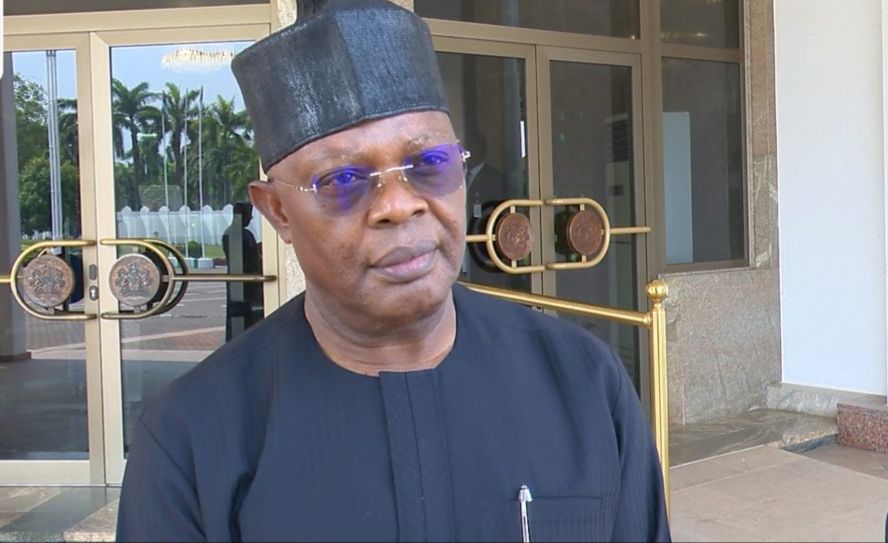
The Chairman of BUA Group, Alhaji Abdul Samad Rabiu, says President Bola Tinubu’s foresight in introducing a duty waiver for essential food items last year has crashed the prices of essential food items.
Rabiu said this while briefing State House Correspondents after a meeting with the President on Thursday at the Presidential Villa, Abuja.
“Food prices are coming down in Nigeria and we’re doing quite a lot to support that effort.
“You will recall that His Excellency granted a duty waiver last year for certain food items like brown rice, maize, wheat, and sorghum to be imported into the country.
“At the time, food prices were very high; the price of rice last year was about N100,000 per 50 kilogramme (kg) bag, and the price of wheat or flour was about N80,000 per bag, maize was about N60,000 per 50 kg bag and pasta about N20,000 per carton,” said Rabiu.
He said his company keyed into that policy and was able to import a lot of wheat, maize, and rice.
He added that when the shipment started coming and the company started processing, it crashed the prices of some of the commodities.
“Today, I’m happy to inform Nigerians that the price of rice is now about N60,000 from what it was last year of N100,000. Flour is today N55,000 per 50 kg bag and maize about N30,000.
“And this happened because of Mr President’s foresight and vision by introducing that one-off duty waiver for a period of six months,” said Rabiu.
He attributed the high prices of food items in the past to the activities of hoarders.
For instance, he said a lot of Nigerian companies bought paddy, which is used to process rice, during harvest season, and hoard it for three to four months.
“The moment the season finishes, then the price will double. That has always been the problem. And that does not really affect the farmer in any way because the farmer is getting his N400,000 to N500,000 per tonne of paddy.
“But the people that are buying and hoarding for three to four months, once the season finishes, it goes back up to N800,000,” he explained.
He said the duty waiver granted by Tinubu created an issue for those hoarders, “because the moment we imported and started selling, those hoarders had a lot of paddy they could not sell.
“So, a lot of those hoarders are actually crying now and losing money.
“It is important to protect our farmers, but at the same time, we also have 250 million Nigerians that are paying a lot more than what they should be paying, because of what few companies or individuals are doing.”
He said members of the Rice Millers Association came together to address the issue, by not allowing members to hoard rice.
He stated that BUA Foods had imported enough rice to last until the end of the year and that anybody who tried to hoard rice and take the price up, BUA would crash the price.
“So, I am hopeful that at the end of the day, the price of rice, going forward, will not go any higher than what it is today.
“And I’m sure as soon as the season starts, the farmers will get the price they’ve always gotten, and the price of rice is going to stay the same because people will be wary of hoarding because if they hoard, they will lose money,” he said.
He said when prices of food items were high, everybody was shouting but now that prices had come down, nobody was coming out to say food prices were coming down.
But he said he was happy that food prices were coming down, and that they would continue to come down.
On the price of cement, he said it was not higher than it should be: “One dollar is N1,600. Cement price today, even if you take it at N9,000 per bag, or 20 bags, which is one tonne, we are looking at N180,000 per tonne.
“N180,000 is $110, maybe $120 per tonne. There’s nowhere in Africa, or anywhere, that you can get the price of cement much lower than 120 dollars. So, the issue is the devaluation of the naira.
“The devaluation happened two years ago, and it was necessary, we needed to do that. And the price of cement at N9,000 is not high, because it’s about $110, $120. Well, N10,000 may be the retail price,” said Rabiu.
He stated that inputs such as energy costs were paid in dollars. “We are paying at one of my factories, the Obu plant, N15 billion every month for the gas that we consume.
“Two, three years ago, we were paying N5 billion. So, it’s like three times. Our spares, our experts, mining costs, and all of that, are paid in dollars.”
Yet, he said cement manufacturers managed to keep the price at about $100 and $120.
“What we have done, though, because I raised that with Mr President, is that we have decided; Alhaji Aliko Dangote of Dangote Cement approached me, and I concurred with him that we should do everything to support Mr President’s Renewed Hope agenda. “And we have decided that we are going to freeze the price of cement to anybody that is involved, or for any contractor that is involved with the Renewed Hope projects.
“What it means is that for any company or anybody that is doing a project under the Renewed Hope, the price of cement will be frozen. There will be no increase for the foreseeable future.
“We are going to send out the letter sometime next week to the Ministry. And I also want to commend Dave Umahi, the Minister of Works, for the initiative to ensure that all the roads are concrete roads.
“This is because concrete roads are more durable. And the cost is going to be cheaper than even bitumen,” he said.







































